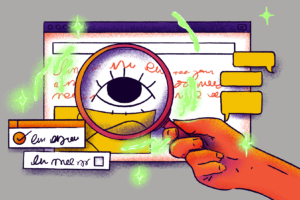Artificial intelligence (AI) is changing the tune of the music industry. Musicians are turning to AI programmes to create new music, like BandLab, which suggests musical loops based on prompts. Listeners are discovering new music on Spotify with AI DJ. An upcoming biopic of legendary singer Edith Piaf uses an AI-generated facsimile of Piaf’s voice. And that’s not all: music event organisers are using AI-powered tools to find more fans for their events.
But how is AI received by those in the music industry? It’s deeply polarising: for some, it’s a tool for creativity and discovery, allowing musicians to experiment and generate new ideas, and fans to find new tracks tailored to their interests. But for others, it’s a worrying development, threatening jobs in the music industry, and allowing global companies to profit from creators’ work without compensation.
For musicians and fans alike, AI is evolving the way music is created and consumed. Discover our deep-dive into what this means for the music industry in 2025.
What AI means for musicians in 2025
Musicians are at the forefront of AI’s impact. From new creative tools to intellectual property debates, AI is changing the landscape for musicians, their work, and their legacy.
Creating music with AI music generators like Suno and AIVA
As a tool to augment creativity, musicians are embracing AI. Many AI tools (like AIVA, Suno, and Moises) are trained on datasets of existing music. The tools use this data to identify patterns and then generate new material, such as melodies, basslines, or chord progressions. The tools can also remove or isolate vocals and instruments, adjust pitch, and even create a song from scratch.
Many musicians are turning to these tools not as replacements for their own creativity, but as an augmentation, using their output for inspiration, transforming it with their own work, or as just another part of the composition process. AI can be, in other words, a tool for collaboration.
This is an important distinction, according to Julia Rowan, Senior Policy and Public Affairs Manager at PRS for Music, the British music copyright collective. “It’s important to distinguish between assistive AI and generative AI,” she said. “By assistive AI, we mean using AI as part of the composition process without necessarily substituting out the composer themselves. One use of AI that has existed for years is for mixing and mastering: it’s a way of augmenting the capacity of the tools that already exist.”
Rowan argued that using AI in music is often seen in a binary way, when the reality is much more nuanced. “Even generative AI tools can be used as a small part of the composition process that is otherwise carried out by a human. Music creators can use AI tools for inspiration and completely transform AI output, for want of a better term, with their creativity. I don’t think it’s quite as binary as not using AI or compromising one’s artistic integrity.”

Protecting creative work
This is one of the biggest concerns about AI for artists in 2025 and beyond: the protection of their work from theft and duplication.
In many cases, AI music models are trained on music without creators’ permission, violating musicians’ rights and blocking their remuneration from royalties or copyright. This very issue caused Edward Newton-Rex, the Vice President of Audio at Stability AI, to resign. “Companies worth billions of dollars are, without permission, training generative AI models on creators’ works, which are then being used to create new content that in many cases can compete with the original works,” he stated.
A recent global AI study — the first of its kind to look at the impact of emerging technology on human creativity — raised major concerns around this unauthorised use. The solution? Many industry leaders are calling for new legislation to protect musicians’ rights and livelihoods in order to ensure the future of the creative industries.
Dean Ormston, the Chief Executive of Australian music rights management organisation Apra Amcos, argued: “Our industry thrives on human creativity. Our songwriters, composers and music publishers are the heart of what makes Australian and New Zealand cultural exports so distinctive. We must ensure strong protections for their work, especially Indigenous Cultural and Intellectual Property, so that AI platforms respect protocols and enhances rather than exploits First Nations culture.”
Other industry voices are calling for more transparency around generative AI. “We need regulation that would place an obligation on AI developers to disclose what their models have been trained on in a way that enables enforcement of their rights by music creators,” said Julia Rowan. According to a study by PRS, 93% of PRS members believe creators deserve to be compensated if their music is used for AI-generated content, and 89% feel that AI tools should be transparent about how they generate AI works.
And plenty of musicians have added their voice to the chorus, too. In 2024, an open letter was issued by the Artist Rights Alliance advocacy group, calling for the protection of artists against AI tools that mimicked human artists. It asked tech companies not to develop artificial intelligence that undermined or replaced human talent. “This assault on human creativity must be stopped,” the letter reads. “We must protect against the predatory use of AI to steal professional artists’ voices and likenesses, violate creators’ rights, and destroy the music ecosystem.” It was signed by over 200 musicians, such as Billie Eilish, Nicki Minaj, Stevie Wonder, and REM.
Competing with AI music
In an already-crowded industry and online streaming space, many musicians are concerned about competing with AI music (such as Jet Fuel & Ginger Ales on Spotify) for streams, thereby losing out on royalties.
And it seems that AI-generated music is only set to take up more space: the global AI study predicted that exponential growth in generative AI music would account for about 20% of traditional music streaming platforms’ revenues by 2028. According to a survey by PRS, 74% of surveyed PRS members expressed concerns around AI-generated music competing with human-made compositions.
Embracing music innovation
Although some musicians are expressing concern over their work and its future, others are embracing AI’s innovative potential. Holly Herndon, for instance, advocates for musicians to use AI to their creative advantage. With her husband and collaborator, Mathew Dryhurst, she created Holly+, a machine learning model trained on her own voice, which can translate any audio file — an instrument, for instance, or another voice — into Herndon’s voice. She saw it as a creative experiment in “decentralising control” of her public identity.
Other musicians, too, are experimenting with AI. When YouTube launched its first set of AI music experiments in collaboration with Google’s DeepMind, nine artists — including Charli XCX, Demi Lovato, Sia, and Charlie Puth — signed up. Using DeepMind’s advanced music generation model, Lyria, the project, titled Dream Track, was designed to explore how AI could create deeper connections between artists and fans.
This is how Dream Track worked: US YouTube creators could type an idea into the creation prompt and pick an artist (such as Charli XCX), and an original soundtrack of up to 30 seconds using that artist’s AI-generated voice would be produced.
For the collaborating musicians, Dream Track was an exciting way to integrate AI into music production with the participation of the musicians themselves. “I’m extremely excited and inspired by the realm of musical possibilities that come from allowing the human mind to collaborate with the non-human mind,” Charlie Puth said of the project. He added that he believed YouTube understood how important it was to work with musicians “to develop this technology responsibly, ensuring it will accelerate creativity instead of replacing it.”

What AI means for music industry employees in 2025
For those working in the music industry, including producers, composers, songwriters, and sound engineers, AI is causing concern, especially with the emergence of new and worrying statistics.
Losing income to AI
AI is causing a huge shift in how music is created, and so it’s no wonder the industry job landscape is set to change, too. According to a global AI report released by the International Confederation of Societies of Authors and Composers (CISAC), music sector workers stand to lose nearly a quarter of their income to AI in the next three years while giant tech companies profit.
The report found that those working in the sector will see their income shrink by more than 20%, while the market for generative AI grows from roughly €3bn annually to a predicted €64bn by 2028.
Under current legal frameworks across the world, music creators would be faced with loss on two fronts: firstly, the unlicensed use of their work by AI models without financial compensation and secondly, shrinking opportunities for human-made work as AI music becomes increasingly competitive. The report argued that revenue generated would represent “a transfer of economic value from creators to AI companies.”
New policies to protect creators from this future are vital. CISAC’s president, former ABBA musician Björn Ulvaeus, said: “AI has the power to unlock new and exciting opportunities — but we have to accept that, if badly regulated, generative AI also has the power to cause great damage to human creators, to their careers and livelihoods.” He argued for legislative reviews across the world to regulate AI use and safeguard human creativity in 2025 and beyond.

What AI means for music event organisers
For music organisers, AI can be a key tool in reaching the right audience.
Finding the right fans
AI technology can offer an exciting way for music organisers to reach the right fans – by making it easy for fans to find them. At Eventbrite, our Chief Product Officer, Ted Dworkin, says that AI is set to revolutionize how people discover things to do —– moving from traditional search functions to more dynamic and personalised ways to find events.
“Imagine being able to have a very lightweight and fluid conversation [with AI] that allows you to understand whether this is the best event for you, what the vibe of the event will be like, and any other event information that you want — and have it all be available just by asking rather than by having to hunt online or figure out keywords and scan QR codes,” Dworkin says.
When it comes to music, AI is set to help fans find the gigs and musical experiences they’re looking for in 2025 — whether that’s a vibe, a genre, or a specific lineup.
What AI means for music fans in 2025
So what does AI mean for the listeners? For many music fans, AI is a fun way to discover new artists, reconnect with old favourites, and dive deeper into tracks they love.
Diving deeper into favourite tracks
A key moment in any music lover’s year: viewing their Spotify Wrapped. For the first time in 2024, Spotify incorporated AI into its beloved Wrapped feature. Built with Google’s NotebookLM, fans could listen to an AI-powered podcast hosted by two AI voices that delved deeper into their listening habits, the inspiration behind their favourite tracks, and more. For some listeners, it was a fun new feature to learn more about their most-loved songs.
But the AI addition to Wrapped didn’t hit the mark for everyone. For others, as journalist Kyndall Cunningham wrote at Vox, the podcast felt “dull” and “mainly proof of how well Google NotebookLM can perform rather than something that enhances user experience in a substantial way.”
Discovering new music
Spotify has long been known for its user-specific, algorithmically generated playlists, and they form a core part of the listening experience for music fans. Its AI-powered features give listeners a way to experiment with creating the perfect playlist and discovering new bands.
With AI Playlists — a feature launched in 2024 — listeners can turn their ideas into bespoke, curated playlists. When a user types a unique prompt into the chat, such as “an indie folk playlist to give my brain a big warm hug” or “a playlist that makes me feel like the main character”, AI will generate a playlist to match. It’s a fun way to experiment with new mixes and set the right musical vibe for the day.
A similar idea underpins the platform’s AI DJ: a little like listening to a radio station, but made just for you and your tastes. The AI guide delivers a personalised lineup of music and commentary.
For some, AI DJ is the perfect way to hear new music and rediscover old favourites. DJ Umami — a DJ working in radio and in clubs — thought the feature was impressive. “It plays my likes on shuffle based on when I actually listen to this type of music and tempo and genre and all of those data points,” Umami said. “Then they’ll throw in a couple songs that they think that I would like. And I love that.”
So what does AI mean for the music industry in 2025?
When it comes to AI, musicians, industry leaders, and fans are divided: some see it as a fun and innovative way to make new music, broaden musical horizons, and embrace change, while others are concerned about its impact on creators’ rights and income.
Emerging AI music technology has highlighted the need for increased regulation of AI models and increased legal protection for creators in 2025. For many, nuance is key to these discussions, acknowledging that AI can be utilised for creativity while also recognising that it poses a threat to creatives’ livelihoods if left unregulated. In the coming years, it’s essential that policymakers listen to the voices of musicians to create legislation that protects the future of the industry.
As Kevin Brannan, the chair of the All-Party Parliamentary Group on Music, wrote: “There have been many technological developments since music was first printed on a page, punched onto a pianola roll, recorded on wax cylinder, disc and tape, or digitised on a computer. AI presents perhaps the greatest challenge of all, but each technological advance also generates an opportunity for creators. We need to muster the will and the vision to seize this one.”






